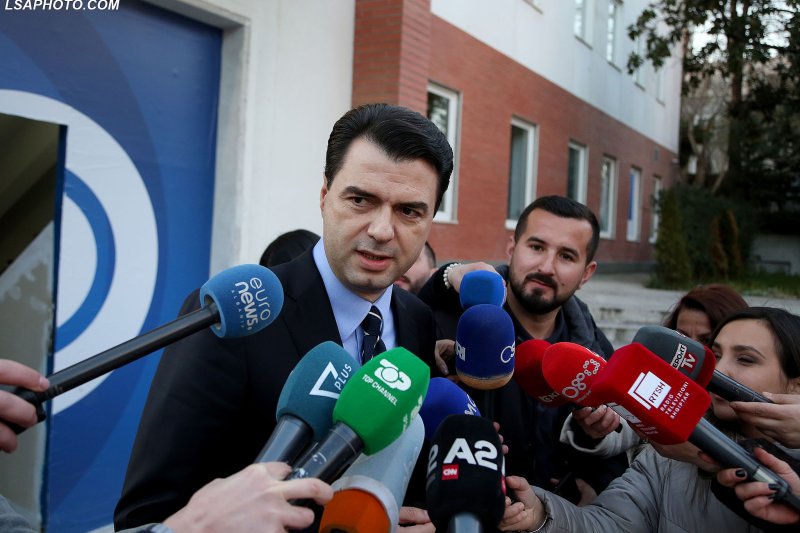Basha's Full Career According to Chronology
Lulzim Basha has resigned after 9 years of leading the Democratic Party (DP). But his story with the DP dates back to 2004 when he was first approached by former Prime Minister Sali Berisha to be part of the policy orientation committee after coming from an experience from Kosovo where he had served at the Court investigating post-war war crimes.
2005-2007 Minister of Transport
After the victory of the Democrats in the 2005 elections, Lulzim Basha became part of the "Berisha 1" government, where he was entrusted with the leadership of the Ministry of Transport, a position he held until 2007.
As Minister of Public Works, Transport and Telecommunications, Basha started the largest infrastructure project in the history of Albania, the Durrës-Kukës Road, which includes the construction of a 5.6 km tunnel. This road unites Albania with Kosovo and is also known as the National Road. In 2007, Albania's Prosecutor General Theodhori Sollaku asked parliament to lift Basha's immunity from prosecution so he could launch an investigation into allegations of corruption and abuse of power in connection with the award of a Durres-Kukes highway construction contract to a joint American-Turkish company. Basha asked parliament to lift his immunity and at the same time considered the allegations as politically motivated. The High Court of Albania dismissed all charges. Two years later, Prosecutor General Thedhori Sollaku was fired by President Bamir Topi for violating the Constitution. He is now part of the governing structures of the Socialist Party.
2007-2009- Minister of Foreign Affairs, Albania joins NATO and Visa Liberalization
Basha served as Minister of Foreign Affairs from May 2007 to September 2009. During his tenure, Albania joined NATO, applied for EU membership and began a dialogue to ensure visa-free travel for its Schengen citizens. .
2009-2011- Minister of Interior
After the 2009 elections in which Lulzim Basha was elected MP of Elbasan, he was appointed Minister of Interior in the new Berisha government. As Minister of Interior, he worked to implement all the criteria required for visa-free travel for Albanians to Schengen countries, including the modernization of Albania's border crossings and immigration police system, the issuance of high-security biometric passports, and a tougher war against criminal activity and criminal assets. These steps were welcomed by international organizations, especially by EUROPOL and other law enforcement agencies and led to the decision of the European Union on November 8, 2010, to abolish travel visas for Albanian citizens starting from December 15, 2010.
2011- Competition with Edi Rama and the victory of the Municipality of Tirana
The year 2011 would bring the biggest victory of Lulzim Basha in his political career, as he would defeat in a direct race the number 1 of the Socialist Party, Edi Rama, in the race for the Municipality of Tirana.
A strong competition wherein the end, after the recount of votes by the CEC, Basha managed to overthrow Rama from the Municipality of Tirana after 3 terms, where he was elected for the first time in 2001.
Under Basha's leadership as mayor, Tirana was provided for the first time in post-communist history with a General Urban Plan, finally ending the chaos of construction in Tirana. The plan was drafted after an extensive discussion with the citizens of Tirana, with architects, engineers, environmental associations and other interested associations. This plan also includes three major projects: the New Boulevard and the River System of Tirana, the Multifunctional Bus and Train Terminal and the Tram Lines Kinostudio-Kombinat and the Square "Mother Teresa" -Multifunctional Terminal.
2013- Competition with Sokol Olldashi.
In the parliamentary elections of June 28, 2013, the Democratic Party passes into opposition after 8 years of government.
Immediately after losing the elections, the historical leader of the Democratic Party, Sali Berisha, resigns and opens election of the new chairman of the Democratic Party.
Lulzim Basha and Sokol Olldashi were in the race to replace Sali Berisha. Democrats on July 13, 2013, elected Lulzim Basha as the new leader of the party with 80% of the vote. In this competition for the first time the principle "one member one vote" was applied.
2014- Battles as chairman of the opposition
Immediately after being re-elected as chairman of the DP, Lulzim Basha started the battle for the decriminalization of the Albanian Parliament in 2014, where the number of characters associated with the criminal world was reduced to the seats of parliament.
The fight between the Socialists and the Democrats in the Assembly for decriminalization finally brought the victory of the opposition in the Assembly, where in 2015 the law on decriminalization was approved, a law which immediately gave effects, as some of the Socialist MPs left their mandates for having been convicted in the past.
2017- Agreement with Edi Rama
3 months before the 2017 parliamentary elections, Lulzim Basha and the DP MPs supported by the militants and the membership stood in the tent in front of the Prime Minister, being considered as one of the biggest opposition resistances.
But after the strong insistence of the internationals, Lulzim Basha meets with Prime Minister Edi Rama on May 17, 2017, which is otherwise known as a secret agreement.
In this agreement, it was decided to have a technical government until the elections, where the opposition took over the leadership of the Ministry of Interior, the Ministry of Justice, and several other ministries.
The 2017 elections are also Basha's first loss as chairman of the Democratic Party.
2019 - Burning of mandates and non-participation in local elections
On February 18, 2019, the "United Opposition", where the DP, SMI and small parties were lined up on one front, decided to burn the mandates, but that did not lead to the realization of the goal that the opposition had, to block the Assembly, as some of the candidates listed on the opposition lists accepted the mandates.
Immediately after the burning of the mandates, the united opposition led by Lulzim Basha started protests all over the country, which led to the final decision of the opposition parties to boycott the local elections of June 30, 2019.
The decision not to participate in the elections was contested and criticized by the international community, as well as the possibility of the majority led by Edi Rama to take 61 municipalities in the country, but due to the decriminalization law, Shkodra Municipality continued to be led by right-wing representative Voltana Ademi, after the leftist candidate was convicted in Italy.
2021- Losing the April 25 elections
The April 25 election had high expectations from the opposition to make the big rotation, in the hope that what had happened in the past where the government fell for a second term would happen.
But on April 25, 2021, Edi Rama is re-elected for the 3rd time as Prime Minister of Albania, after the SP managed to get 74 seats in the Assembly. For Lulzim Basha, this was the defeat that would lead to his downfall.
After losing the election and growing criticism within the party, Lulzim Basha decided to open the race for party chairman, while deciding to freeze his position.
After the June 13 elections in all branches of the Democratic Party, Lulzim Basha is reconfirmed as mayor receiving 81% of the vote, while Agron Shehaj, Fatbardh Kadili and Edith Harxhi competed against him.
September 9, 2021- The big battle with Sali Berisha…
Lulzim Basha and Sali Berisha had created the idea not only within the Democrats but also among the Albanians that they were an indivisible binomial, where not infrequently the former historical leader of the Democrats was accused of naming his successor in 2013, despite the vote.
Even Berisha in his public speeches was one of the biggest supporters of Lulzim Basha, attributing to him the great achievements of the Democratic government such as NATO membership or visa liberalization.
But what changed the relationship between them was the statement of Lulzim Basha on September 9, who suspended Sali Berisha from all functions, after the decision given by DOS on May 26 for declaring Berisha and his family non-grata. September 9 would officially start the big fight between Basha and Berisha.
The former Democratic leader started the meetings with the Democrats at the base under "Foltore", and managed to convene the National Assembly on December 11, where, according to them, the decision was made to dismiss Basha.
Meanwhile, December 18 would mark another strong clash not only between Berisha and Basha, but between the Democrats themselves.
On the one hand, Basha called the National Assembly, while on the other hand, Berisha and the Re-establishment Group had announced a referendum to confirm the December 11 decision to dismiss Lulzim Basha. In both cases, both Basha and Berisha each declared their victory.
2022- March 6 elections and Basha's resignation
The March 6 elections were the final confrontation this time not between the opposition and the majority, but between the official DP of Lulzim Basha and the 'House of Freedom' supported by Sali Berisha.
At the beginning of 2022, on January 8, Democrats led by Sali Berisha demanded to take the seat of the Democratic Party, which led to a physical clash between the members, and only the intervention of the police, which was later accused of violence, calmed the situation.
On March 6, 2022, Lulzim Basha's candidates suffered a great defeat in all 6 Municipalities, where apart from Rrogozhina where the DP candidate was ranked second in 5 others.
Immediately after the March 6 elections, those who supported Basha demanded his removal from the leadership of the party, which led to the resignation of the deputy chairmen, Grida Duma and Agron Gjekmarkaj, who had only two months in that post after replacing the outgoing Alfred Rushaj.
Tensions within the DP caused Basha to call several times in the meeting the MPs but also the heads of the branches, while he asked them for a deadline to express the decision taken by him.
And on Monday, March 21, Lulzim Basha urgently convenes a meeting of the parliamentary group, the party leadership and the heads of the branches to communicate his resignation, but hinting that he will continue to stay within the party.














